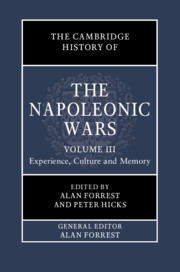Book contents
- The Cambridge History of the Napoleonic Wars
- The Cambridge History of the Napoleonic Wars
- The Cambridge History of the Napoleonic Wars
- Copyright page
- Contents
- Figures
- Maps
- Contributors to Volume III
- Introduction to Volume III
- Part I The Experience of War
- 1 The Soldiers’ Experience of War
- 2 Military Values: Heroism and Masculinity
- 3 Military Medicine
- 4 Women and the Home Front
- 5 Prisoners of War
- Part II The Experience of Imperial Rule
- Part III War, Culture and Memory
- Part IV The Aftermath and Legacy of the Wars
- Bibliographic Essays
- Index
4 - Women and the Home Front
from Part I - The Experience of War
Published online by Cambridge University Press: 05 August 2022
- The Cambridge History of the Napoleonic Wars
- The Cambridge History of the Napoleonic Wars
- The Cambridge History of the Napoleonic Wars
- Copyright page
- Contents
- Figures
- Maps
- Contributors to Volume III
- Introduction to Volume III
- Part I The Experience of War
- 1 The Soldiers’ Experience of War
- 2 Military Values: Heroism and Masculinity
- 3 Military Medicine
- 4 Women and the Home Front
- 5 Prisoners of War
- Part II The Experience of Imperial Rule
- Part III War, Culture and Memory
- Part IV The Aftermath and Legacy of the Wars
- Bibliographic Essays
- Index
Summary
In Leo Tolstoy’s War and Peace (1868) Napoleon’s invasion of Moscow in 1812 is the occasion for the redemption and domestication of the heroine, the lively and impulsive Natasha Rostov. As the invading forces approach Moscow, Natasha briskly superintends the family’s preparations to evacuate the city. Moved by patriotic compassion, she offers the Rostovs’ residence to the army. Eventually she is reconciled with the lover she betrayed, Prince Andrei Bolkonsky, when, after he is fatally wounded at the Battle of Borodino, she nurses him until his death. The novel concludes with Natasha’s marriage to Pierre Bezukhov; her ‘old fire’ is dampened as she devotes her life entirely to her husband and children and settles into a ‘vigorous maternity’.1 Natasha’s ‘fall’ and ‘redemption’ have been read as an allegory for Russia’s near ‘rape’ and ‘deliverance’ from the French invaders. Her spirited performance of a traditional folk dance earlier in the novel and her espousal of a contented domesticity at its end emblematise the rejection of the Francophile cosmopolitanism of pre-war St Petersburg salons and the embrace of an authentic Russian femininity.
- Type
- Chapter
- Information
- The Cambridge History of the Napoleonic Wars , pp. 73 - 92Publisher: Cambridge University PressPrint publication year: 2022

